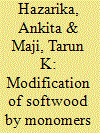| Srl | Item |
| 1 |
ID:
170701


|
|
|
|
|
| Summary/Abstract |
Design anthropology has developed to become an influential sub-discipline occupied with both theoretical and applied knowledge targeted at designers’ real-life challenges. Bearing this in mind, in the last decade we have developed this attitude into a methodology centered around the identification and development of ‘cultural objects’ that can be implemented with insight and understanding within a conventional design process. This methodology isolates and magnifies the cultural aspects of objects and harnesses these to design new hybrid objects that reinterpret and translate cultural values and characteristics into a local context. This paper presents one of the various approaches dealing with the interpretation of philosophic, religious or socio-cultural principles of different cultures through an Israeli designer’s eyes. In this case the re-interpretation of Japanese, African or American cultures of wood and materializing various cultural traits led the students to an intricate and meaningful design process. From the results we recognized two points of significance: understanding that designing and researching through the isolation of a specific material (i.e., wood), the anthropological design process is crystalized and produces profound results that are culturally centered; the second was an insight into how young Israeli designers presented a unique and innovative approach towards contemporary Israeli design through the culture of wood.
|
|
|
|
|
|
|
|
|
|
|
|
|
|
|
|
| 2 |
ID:
188561


|
|
|
|
|
| Summary/Abstract |
Developing effective policy solutions to transition away from the use of solid fuels for residential heating purposes can be hindered by the lack of reliable data on its use. One such issue is the extent of informal solid fuel use, that is, consumption from sources outside of formal commercial channels. This is an area which has been largely ignored in previous empirical research. Using a survey of residential solid fuel users, the extent of solid fuel use in the residential sector in Ireland from informal sources for two fuels, sod peat and wood, is quantified. Sod peat is found to be almost exclusively sourced informally while just over half of wood use is estimated to be sourced by households in this way. Factors including location, household income, being a primary user of the fuel and having strong cost motivations all effect the probability of sourcing solid fuels informally relative to formal sources. The sizeable extent to which informal sources of solid fuels are used in Ireland arising from the analysis in this paper, highlights the potential for substitution to this unregulated alternative. This should be carefully monitored for effective implementation of new and existing solid fuel regulations.
|
|
|
|
|
|
|
|
|
|
|
|
|
|
|
|
| 3 |
ID:
130735


|
|
|
|
|
| Publication |
2014.
|
| Summary/Abstract |
Technological development of wood polymer composites (WPC) is a very promising approach to overcome most of the disadvantageous properties of wood products, for example their poor mechanical strength, poor dimensional stability, susceptibility to fungal attack, weathering and the like. To find the substitute for costly items of hard wood, suitable technologies have been developed to modify softwood to meet specific end-use requirements. Various vinyl monomers and/or copolymers or thermosetting resin in combination with different types of cross linking agents, flame retarding agents have been used to improve the properties of wood. Nanotechnology is a new area of science and technology which opens up new opportunities to develop wood based products with desired properties. Now-a-days government is making strict legislations to promote green technology for the protection of environment world wide. With the depletion of petroleum resources at alarming rate, it is high time to replace petroleum-based products by some sustainable alternative products based on vegetable biomass. The bio-based resins obtained from renewable feedstock have been widely utilized by taking the advantages of easy availability, renewable nature and low cost. The green route of modification of wood is widely encouraged. With the progress of technological development, now it is possible to avoid the hazardous influence of organic solvents by using water as solvent or diluents formodification of wood. WPC has got tremendous scope for use in diverse areas of applications.
|
|
|
|
|
|
|
|
|
|
|
|
|
|
|
|